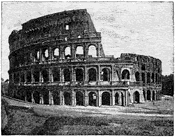
PISH-POSH FROM MY VIRTUAL SPACEby David EideThe Values That Emerge
|

Idle Musings of the Hypothetical Citizen
Of course, the hypothetical citizen wasn't plopped down in the middle of a city, on a bright afternoon from some previous age. He was not magically conjured from the bowels of a distant time when Americans were farmers and knew all their neighbors. No, he lived in a time of furious denial of all he believed, surrounded by the lingering anger of two types of people: those paralyzed by fear and those made crazed by the prospects of ultimate power, even if it was over their pet cat.
One had too much knowledge; the other not enough.
His most dangerous thought: They would not be recognized by those who had created the bounty.
The problem of remaining a citizen went to an irreducible fact: The citizen could perceive more than he could know. Therefore, he was in a state of perpetual fear or lust. Therefore, the temperament for a liberal, democratic culture was not present.
Two things had to be present in a liberal, democratic citizen. One was a sense of connection with the well-springs of the culture. Without this connection the citizen became a wondering ghost, without a chance of fulfilling his or her potential. And, on the other hand, the ability to objectify power and prevent power from objectifying him. This was the crucial test. And, of course, modern society had broken everything down into fragments so that these attributes were the creation of political parties and institutions. But those who believed they had connection did not evidence any knowledge of the well-springs and only wanted to be protected from danger. And those who claimed they could objectify the acts of power did so using old, outmoded systems that had no relevance in a modern society.
It was not shocking then, that the hypothetical citizen saw dysfunction everywhere!
Often he told himself to lighten up, take a deep breath, go smell the flowers.
Where he lived, there was a great deal of possession. Oh people, he told them, silently so not to become one himself, "the artist is the only one among you who can afford to be possessed. All the dangers are driven into his work."
He had been running into a particular kind of human being of late, down in the industrial section where he worked in a chemical plant. He was the type one feels has been through generations of wars and hardship. He called him the werkes foreman who wanted power and scorned wisdom. He always contrasted the werkes foreman with another types he'd been around. He who cultivated his own brain, which he assumed was beautiful. Perhaps the man had a Christ complex. He fantasized, no doubt, that a cult would, one day, be located around the dry fires of his beautiful brain.
He agreed with this view: There was a virtuous seed and a poisonous seed in the democratic creed. Every person had a chance to do something extraordinary in their life. "If he has done it, I can do it." Many times the very worst in nature attached itself to the creed and pulled everything down with it. The virtue was that one must always believe that the extraordinary was possible.
In this mood he passed a wall stenciled with a spray-painted message that read, "Remember the number one lesson: all possibility, little actuality. The cycle to watch for" And below it, in cursive, "Wanting to do as much as possible, driven to truth and beauty, a fall into complexities, embarrassment over vanity, and depressed by lost time."
He admired the way the people looked after each other as should be the case in a democracy.
"Ah," the prophet was saying, "you live in a classless society filled with the presumptions of class. You try to magically alienate it from yourself down to the next class but rarely recognize that the same thing occurs to you."
Oh prophet, go away, he thought to himself. Things do get better on reflection, the coming of myself and yet it is of something not myself. I can see autonomy, tension, hope. So the reflected image is not shrouded by prejudice, presumption but allowed a freedom one doesn't speak about. It is ironic. At any time, of course, old confusions came rushing in to destroy the reflection and subdue it with a feeling of dread, anxiety, and guilt. There were images of what one has experienced, they had a certain autonomy. Then the choice is, simply, objectivity or love?
© 2003 David Eide. All rights reserved.
David Eide
Back to Oasis